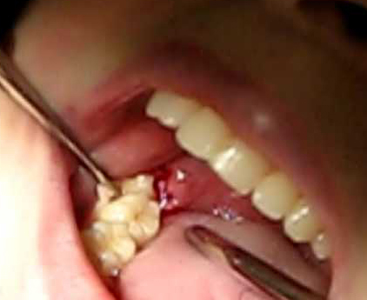Wisdom teeth are the upper and lower third molars, located at the very back of the mouth. They are called wisdom teeth because usually they come in when a person is between 17 and 21 years or older old enough to have gained some wisdom. Wisdom teeth that are healthy and properly positioned do not cause problems.
What Causes Problems with Wisdom Teeth?
Wisdom teeth may break partway through your gums, causing a flap of gum tissue to grow over them where food can become trapped and a gum infection can develop. Wisdom teeth can also come in crooked or facing the wrong direction. Or, if your jaw is not large enough to give them room, they may become impacted and unable to break through your gums. You may have trouble properly cleaning around wisdom teeth because they are so far in the back of your mouth and may be crowded.
Wisdom Tooth Removal Surgery
Before removing a wisdom tooth, your dentist will give you a local anaesthetic to numb the area where the tooth will be removed. A general anaesthetic may be used, especially if several or all of your wisdom teeth will be removed at the same time. A general anaesthetic prevents pain in the whole body and will make you groggy or cause you to sleep through the procedure. Your dentist will probably recommend that you dont eat or drink after midnight on the night before surgery, so you are prepared for the general anaesthetic.
To remove the wisdom tooth, your Oral and Maxillofacial Surgeon will open up the gum tissue over the tooth and take out any bone that is covering the tooth. He or she will separate the tissue connecting the tooth to the bone and then remove the tooth. Sometimes he/she may cut the tooth into smaller pieces to make it easier to remove.
After the tooth is removed, you may need stitches. Some stitches dissolve over time and some have to be removed after a few days. Your dentist will tell you whether your stitches need to be removed. A folded cotton gauze pad placed over the wound will help stop the bleeding.
What to Expect After Surgery
In most cases, the wisdom tooth recovery period lasts only a few days. Take painkillers for wisdom tooth pain relief as prescribed by your dentist or oral surgeon. The following tips will help speed your recovery.
- Bite gently on the gauze pad periodically, and change pads as they become soaked with blood. Call your dentist or oral surgeon if you still have bleeding 24 hours after your surgery.
- While your mouth is numb, be careful not to bite the inside of your cheek or lip, or your tongue.
- Do not lie flat. This may prolong bleeding. Prop up your head with pillows.
- Try using an ice pack on the outside of your cheek for the first 24 hours. You can use moist heat-such as a washcloth soaked in warm water and wrung out-for the following 2 or 3 days.
- Relax after surgery. Physical activity may increase bleeding.
- Eat soft foods, such as gelatin, pudding, or a thin soup. Gradually add solid foods to your diet as healing progresses.
- Do not use a straw for the first few days. Sucking on a straw can loosen the blood clot and delay healing.
- After the first day, gently rinse your mouth with warm salt water several times a day to reduce swelling and relieve pain.
- Do not smoke for at least 24 hours after your surgery. The sucking motion can loosen the clot and delay healing. In addition, smoking decreases the blood supply and can bring germs and contaminants to the surgery area.
- Avoid rubbing the area with your tongue or touching it with your fingers.
- Continue to brush your teeth and tongue carefully.
Your dentist will remove the stitches after a few days, if needed.
Wisdom teeth removal complications
After a wisdom tooth is removed, you may experience:
- Pain and swelling in your gums and tooth socket where the tooth was removed.
- Bleeding that won’t stop for about 24 hours.
- Difficulty with or pain from opening your jaw (trismus).
- Slow-healing gums.
- Damage to existing dental work, such as crowns or bridges, or to roots of a nearby tooth.
- A painful inflammation called dry socket, which happens if the protective blood clot is lost too soon.
- Numbness in your mouth and lips after the local anaesthetic wears off, due to injury or inflammation of nerves in the jaw.
Most of these complications are rarely encountered in the hands of experienced surgeons. Dr Pavan M Patil has successfully operated on more than 1000 such cases worldwide.
Cost of Wisdom Tooth Extraction
It is impossible to give an exact figure on wisdom tooth surgery cost because of the many variations in every case such as: the different types of complications that can be present, prices in your area, if you have dental/health insurance, experience of the oral professional you go to and more. Impacted wisdom teeth extraction cost is significantly higher compared to erupted wisdom teeth removal cost due to the more complex nature of the operation and the amount of time needed to perform the procedure. An impacted wisdom tooth is one in which the tooth is either partially erupted (still covered by gum to some extent) or is still located in the patients jaw. Cosmozone offers a risk free procedure at a cost that is value for money!
















